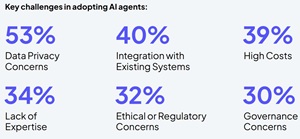ARTICLE AD BOX
Study: Data Privacy a Top Concern as Orgs Scale Up AI Agents
- By David Ramel
- 04/29/25
As organizations race to integrate AI agents into their cloud operations and business workflows, they face a crucial reality: while enthusiasm is high, major adoption barriers remain, according to a new Cloudera report. Chief among them is the challenge of safeguarding sensitive data.
AI agents are a hot topic in advanced generative AI development because they move beyond simple prompt-and-response models, enabling autonomous reasoning, decision-making, and multi-step task execution — effectively turning AI from a passive tool into an active collaborator.
With AI agents increasingly embedded in core IT systems, customer interactions, and infrastructure optimization, concerns about data privacy have emerged as the top issue holding organizations back, said the report from Cloudera, which sells a hybrid platform for data, analytics, and AI. Before companies can fully realize the transformative potential of agentic AI, they must first build trust that these autonomous systems can handle critical enterprise data securely and compliantly.
"When asked to rank their top concerns in adopting AI, respondents pointed to data privacy concerns (53%), followed by integration with existing systems (40%) and high implementation costs (39%)," the report said. "These findings illustrate that trust and compatibility issues are primary roadblocks, as enterprises worry about safeguarding sensitive data and transforming legacy environments."
Here's a summary of top challenges to AI agent adoption:
- Integration Complexity (40%): Many enterprises find it extremely challenging to integrate AI agents into existing legacy systems and cloud architectures.
- High Costs (39%): Beyond the initial investment, scaling and operationalizing AI agents require significant spending on infrastructure, security, and skills development.
- Lack of Expertise (34%): Organizations struggle to find or train staff capable of building, deploying, and managing agentic AI effectively at scale.
- Ethical and Regulatory Concerns (32%): Enterprises are worried about AI agents making biased decisions or taking actions that could violate compliance or ethical standards.
- Governance Concerns (30%): There's widespread recognition that without strong accountability frameworks, autonomous agents could act in ways that are hard to monitor or control.
"To be fair, 37% of surveyed enterprises report that integrating AI agents into current systems and workflows has been very or extremely challenging," the report said. "This finding points to integration as a pain point for large organizations with complex IT ecosystems. In other words, deploying AI agents is not a plug-and-play endeavor. For this reason, deploying and managing agentic AI demands skilled professionals and proper infrastructure. The most effective way for organizations to begin leveraging agentic AI is by evaluating their existing infrastructure to ensure it meets the necessary requirements, focusing on data management, security, and compliance standards. Equally important is training teams to effectively manage and deploy AI agents, starting with small-scale implementations to assess their impact before expanding on a larger scale."
-

New Education Design Lab Initiative Convenes Five Community Colleges to Reimagine Their Future
Education Design Lab, a nonprofit devoted to designing, prototyping, and testing education-to-workforce models, has announced the inaugural cohort of its Reimagining Community Colleges Design Challenge.
-

New Turnitin Product Brings AI-Powered Tools to Students with Instructor Guardrails
Academic integrity solution provider Turnitin has introduced Turnitin Clarity, a paid add-on for Turnitin Feedback Studio that provides a composition workspace for students with educator-guided AI assistance, AI-generated writing feedback, visibility into integrity insights, and more.
-

The 2025 NFL Draft and Ed Tech Selection: A Strategic Parallel
In the fast-evolving landscape of collegiate football, the NFL, and higher education, one might not immediately draw connections between the 2025 NFL Draft and the selection of proper educational technology for a college campus. However, upon closer examination, both processes share striking similarities: a rigorous assessment of needs, long-term strategic impact, talent or tool evaluation, financial considerations, and adaptability to a dynamic future.
-

Complete College America Launches Center to Boost Data-Driven Student Success Strategies
National nonprofit Complete College America (CCA) recently launched the Center for Leadership, Institutional Metrics, and Best Practices (CLIMB), with the goal of helping higher education institutions use data-driven strategies to improve student outcomes.










 English (US) ·
English (US) ·